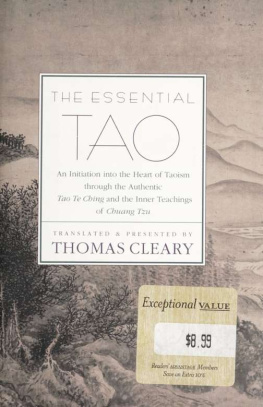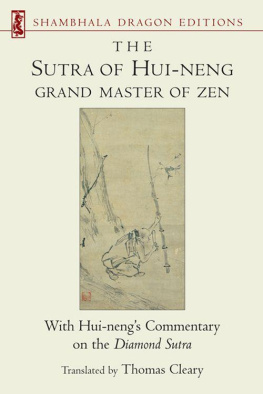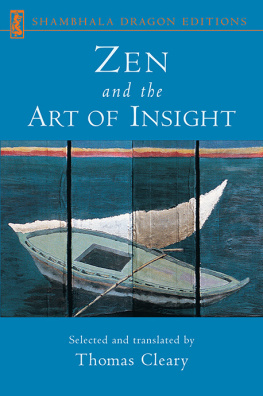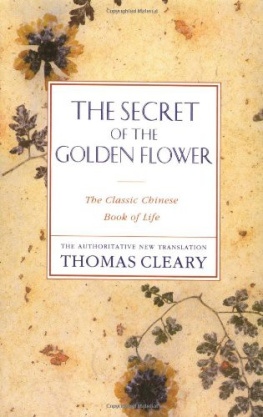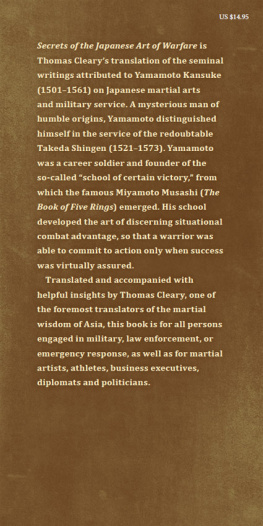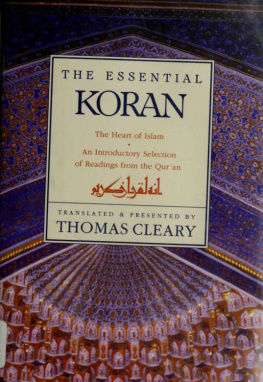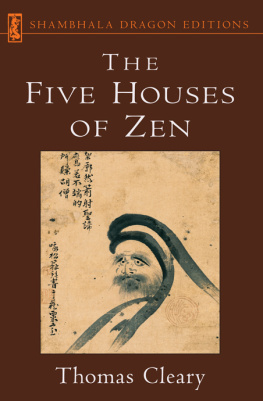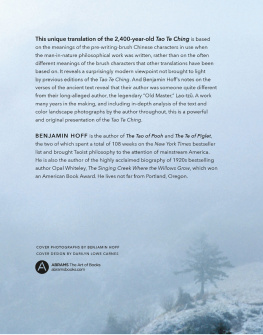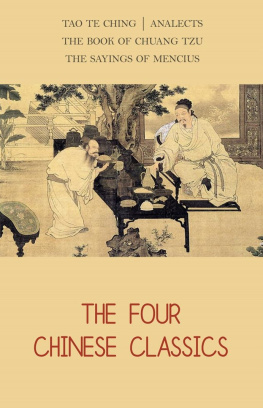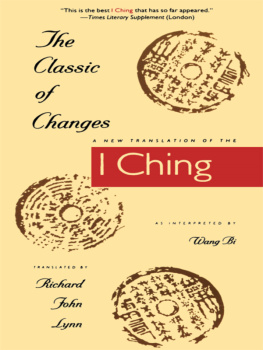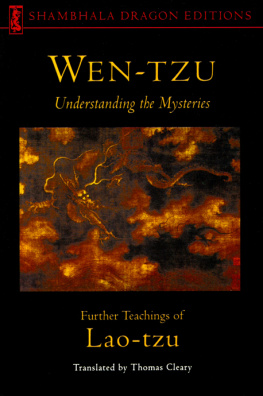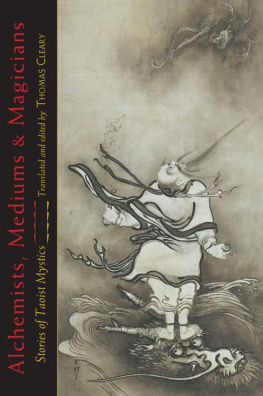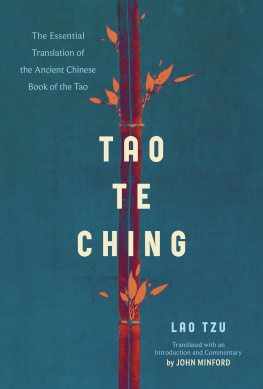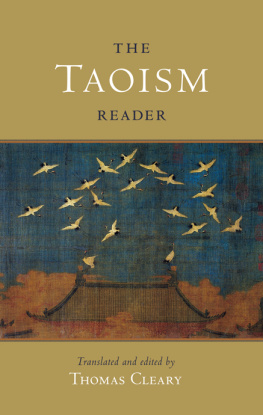Thomas Cleary - The Essential Tao
Here you can read online Thomas Cleary - The Essential Tao full text of the book (entire story) in english for free. Download pdf and epub, get meaning, cover and reviews about this ebook. year: 1998, publisher: Book Sales, genre: Politics. Description of the work, (preface) as well as reviews are available. Best literature library LitArk.com created for fans of good reading and offers a wide selection of genres:
Romance novel
Science fiction
Adventure
Detective
Science
History
Home and family
Prose
Art
Politics
Computer
Non-fiction
Religion
Business
Children
Humor
Choose a favorite category and find really read worthwhile books. Enjoy immersion in the world of imagination, feel the emotions of the characters or learn something new for yourself, make an fascinating discovery.
- Book:The Essential Tao
- Author:
- Publisher:Book Sales
- Genre:
- Year:1998
- Rating:3 / 5
- Favourites:Add to favourites
- Your mark:
- 60
- 1
- 2
- 3
- 4
- 5
The Essential Tao: summary, description and annotation
We offer to read an annotation, description, summary or preface (depends on what the author of the book "The Essential Tao" wrote himself). If you haven't found the necessary information about the book — write in the comments, we will try to find it.
The Essential Tao — read online for free the complete book (whole text) full work
Below is the text of the book, divided by pages. System saving the place of the last page read, allows you to conveniently read the book "The Essential Tao" online for free, without having to search again every time where you left off. Put a bookmark, and you can go to the page where you finished reading at any time.
Font size:
Interval:
Bookmark:

This book made available by the Internet Archive.








V
A
i
%
I
V
Introduction
Tao is one of the most basic and comprehensive symbols in the Chinese language, the center of all philosophical and spiritual discourse. It may mean a path, a way, a principle, a method, a doctrine, a system of order; and it also may mean the matrix, structure, and reality of the universe itself. Every art and science is called a tao, or a way; but the source of everything, the fountain of all art and science, is called the Tao, or the Way.
Taoism is based, first and foremost, on the experience of this universal Way, the essential reality through which all derivative ways might be comprehended.
Considering the ultimate nature of the Way to be inherently beyond the bounds of human conception, ancient Taoists sought traces of the Way in the patterns of events taking place in the natural world, the social world, and the inner world of the individual psyche. Eventually the scope of the Way led them to undertake the investigation of vast domains of knowledge and experience.
While followers of Taoism thus branched out into many different fields of research and work, those interested primarily in the essential Tao continued to focus on perfecting the mastery of human nature and life in three critical areas: individual well-being, social harmony, and accelerated evolution of consciousness. These three bases were believed to form the foundation of overall human development, the guiding lights of the arts and sciences.
Through generations of applying the Tao to these three basic domains of life, extraordinary accomplishments in the maintenance of physical vitality, fostering of sensitive and effective
relations between people, and development of latent mental powers, including spontaneous insight and foreknowledge, came to be recognized as by-products of working with the Way.
Furthermore, according to the ethos of the Way, these developments, once realized, were not to be guarded possessively but put to the service of humanity. In accordance with the elusive nature of the Way, the beneficial results of its application by individuals were not to be paraded proudly before others but to be diffused in an inconspicuous yet effective manner.
There are two classic Chinese books describing the essential philosophy and practice of the Tao, made public long ago as maps of the way to the Way: Tao Te Ching and Chuang-tzu. Both these works have long outgrown cultural boundaries and are widely regarded as classics of world literature.
Composed over two thousand years ago, Tao Te Ching and Chuang-tzu are among the worlds most ancient and honored books of practical wisdom. Their subject matter ranges widely, from politics and economy to psychology and mysticism, addressing the needs and interests of a diverse reader-ship. Few of the worlds great books have achieved the perennial currency of these writings.
The Tao Te Ching is an anthology of ancient sayings, poems, and proverbs; its compilation is attributed to the prototypical Lao-tzu, The Old Master, who is regarded as one of the greatest ancestors of Taoism. Chuang-tzu, traditionally said to have been written by a Taoist named Chuang Chou, is a collection of stories and monologues illustrating and expounding the teachings of the Tao Te Ching. Together they present the philosophical and practical core of classical Taoism.
The Tao Te Ching is commonly believed to have been compiled around 500 B.C., near the end of the Spring and Autumn era, when the social and political order of China was disintegrating rapidly. The Chuang-tzu was written about 300 B.C., during the era of the Warring States, when the classical civilization of China was all but destroyed by civil wars.
By the middle of the second century B.C., after the unification of China, Tao Te Ching was firmly established at the imperial court as a favorite sourcebook of practical wisdom. The more arcane Chuang-tzu was transmitted in Taoist circles, as evidenced in the appearance of many allusions to it in later Taoist works of the pre-Christian era, eventually to emerge in the third century A.D. as a popular classic of deep learning ranked with 1 Ching and Tao Te Ching.
Ever since that time, virtually all literate people in China have read Tao Te Ching and Chuang-tzu. Countless readers have found endless fascination and enlightenment in the pregnant aphorisms and fantastic allegories of these ancient classics.
Over the centuries the Tao Te Ching in particular has inspired many social and spiritual movements as well as a vast body of exegetical literature. Various traditions on this text evolved among Taoist, Buddhist, Confucian, Legalist, and Martial schools of thought.
At one time, state colleges of mysticism were even established by the Chinese government for study of the philosophy of Tao Te Ching. People who had mastered it were sought as advisers by all kinds of people from emperors to peasants. When the Taoist canon was put to the torch by the order of the Mongol ruler of China in 1280, this Tao Te Ching alone was spared destruction.
Although commonly associated with Taoism, this classic was actually studied and transmitted by all of the main streams of Chinese philosophy. Commentators on it include mystics, poets, statesmen, and martial artists; numerous separate works have also been written based on some of its ideas. Over the centuries this single text spawned a vast and complex literature, reflecting the many levels of meaning revealed and concealed within its ancient sayings.
Tao Te Ching has been translated countless times into Western languages, including English, French, German, Italian,
Russian, Turkish, and Latin. It was first rendered into English more than one hundred years ago and has been retranslated, paraphrased, and adapted dozens of times since then. This volume on the essential Tao presents a new annotated English version of this classic text translated from the original Chinese.
Chuang-tzu also ranks as one of the most famous works of Chinese literature as well as being an essential Taoist source-book. It contains the works of different authors believed to be followers of the school of Chuang Chou, but its seven core chapters are attributed to Chuang Chou himself. He was the earliest known expositor of the teachings of Lao-tzu, and is himself numbered among the foremost masters of Taoist philosophy.
Chuang Chou was a deep thinker and a brilliant writer. He could be magnificent and grandiose, outrageous and funny, sharp and acerbic, dreamy and playful, sober and earnest, serene and unruffled. The inner meanings of his allegories have been pondered for centuries.
Font size:
Interval:
Bookmark:
Similar books «The Essential Tao»
Look at similar books to The Essential Tao. We have selected literature similar in name and meaning in the hope of providing readers with more options to find new, interesting, not yet read works.
Discussion, reviews of the book The Essential Tao and just readers' own opinions. Leave your comments, write what you think about the work, its meaning or the main characters. Specify what exactly you liked and what you didn't like, and why you think so.

